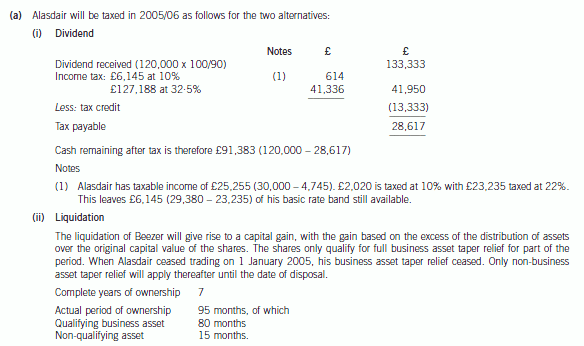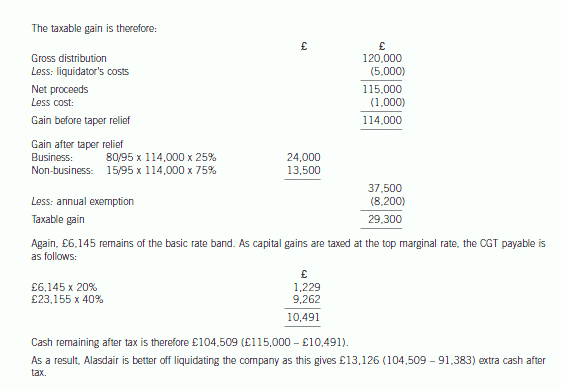ACCA历年真题在哪可以免费下载?速度了解一下!
发布时间:2020-01-04
你知道ACCA历年真题在哪可以免费下载?不知道的小伙伴赶紧跟着51题库考试学习网一起来了解一下吧!
ACCA历年真题是ACCA常用备考资料之一,很多刚刚接触ACCA的学员还不知道ACCA历年真题在哪里找,怎么下载?下面51题库考试学习网为大家详细介绍一下。
ACCA在国内称为"国际注册会计师",实际上是英国的注册会计师协会之一(英国有多家注册会计师协会),但它是英国具有特许头衔的4家注册会计师协会之一,也是当今知名的国际性会计师组织之一。
学员可以在ACCA全球官网首页按如下顺序点击相应链接students&affiliates---acca qualification----exams----past exam
papers或者你也可以在网页右上角的灰色搜索条内输入你要搜索的科目+past paper字样,比如搜索F7,即输入“F7 past papers”;你也可以通过这个方法搜索考官文章,比如“F7 technical articles”、“F7 examiner’s
approach”。
除此之外,为了方便大家下载资料,51题库考试学习网还分享了ACCA常用备考资料,包括ACCA考官文章、历年真题、考试大纲,大家可以自行下载!
ACCA是国际会计准则委员会(IASC)的创始成员,也是国际会计师联合会(IFAC)的主要成员。ACCA在欧洲会计专家协会(FEE)、亚太会计师联合会(CAPA)和加勒比特许会计师协会(ICAC)等会计组织中起着非常重要的作用。
ACCA考试是按现代企业财务人员需要具备的技能和技术的要求而设计的,共有13门课程,两门选修课,课程分为3个阶段:
第一阶段(知识阶段)(AB MA FA)分涉及基本会计学原理、管理学原理、管理会计基础;
第二阶段(技能阶段)(LW PM TX FR AA FM)涵盖专业财会人员应具备的核心专业技能;
第三阶段(高级阶段)(SBL SBR APM AFM ATX AAA)培养学员以专业知识对信息进行评估,并提出合理的经营建议和忠告。
以上就是51题库考试学习网带给大家的内容,如果还有其他不清楚的问题,请及时反馈给51题库考试学习网,我们会尽快帮您解答。
下面小编为大家准备了 ACCA考试 的相关考题,供大家学习参考。
4 (a) ISA 701 Modifications to The Independent Auditor’s Report includes ‘suggested wording of modifying phrases
for use when issuing modified reports’.
Required:
Explain and distinguish between each of the following terms:
(i) ‘qualified opinion’;
(ii) ‘disclaimer of opinion’;
(iii) ‘emphasis of matter paragraph’. (6 marks)
4 PETRIE CO
(a) Independent auditor’s report terms
(i) Qualified opinion – A qualified opinion is expressed when the auditor concludes that an unqualified opinion cannot be
expressed but that the effect of any disagreement with management, or limitation on scope is not so material and
pervasive as to require an adverse opinion or a disclaimer of opinion.
(ii) Disclaimer of opinion – A disclaimer of opinion is expressed when the possible effect of a limitation on scope is so
material and pervasive that the auditor has not been able to obtain sufficient appropriate audit evidence and accordingly
is unable to express an opinion on the financial statements.
(iii) Emphasis of matter paragraph – An auditor’s report may be modified by adding an emphasis of matter paragraph to
highlight a matter affecting the financial statements that is included in a note to the financial statements that more
extensively discusses the matter. Such an emphasis of matter paragraph does not affect the auditor’s opinion. An
emphasis of matter paragraph may also be used to report matters other than those affecting the financial statements
(e.g. if there is a misstatement of fact in other information included in documents containing audited financial
statements).
(iii) is clearly distinguishable from (i) and (ii) because (i) and (ii) affect the opinion paragraph, whereas (iii) does not.
(i) and (ii) are distinguishable by the degree of their impact on the financial statements. In (i) the effects of any disagreement
or limitation on scope can be identified with an ‘except for …’ opinion. In (ii) the matter is pervasive, that is, affecting the
financial statements as a whole.
(ii) can only arise in respect of a limitation in scope (i.e. insufficient evidence) that has a pervasive effect. (i) is not pervasive
and may also arise from disagreement (i.e. where there is sufficient evidence).
6 Alasdair, aged 42, is single. He is considering investing in property, as he has heard that this represents a good
investment. In order to raise the funds to buy the property, he wants to extract cash from his personal company, Beezer
Limited, whose year end is 31 December.
Beezer Limited was formed on 1 May 1998 with £1,000 of capital issued as 1,000 £1 ordinary shares, and traded
until 1 January 2005 when Alasdair sold the trade and related assets. The company’s only asset is cash of
£120,000. Alasdair wants to extract this cash from the company with the minimum amount of tax payable. He is
considering either, paying himself a dividend of £120,000, on 31 March 2006, after which the company would have
no assets and be wound up or, leaving the cash in the company and then liquidating the company. Costs of liquidation
of £5,000 would then be incurred.
Since Beezer Limited ceased trading, Alasdair has been taken on as a partner at a marketing firm, Gallus & Co. He
estimates his profit share for the year of assessment 2005/06 will be £30,000. He has not made any capital disposals
in the current tax year.
Alasdair wishes to reinvest the cash extracted from Beezer Limited in property but is not sure whether he should invest
directly in residential or commercial property, or do so via some form. of collective investment. He is aware that Gallus
& Co are looking to rent a new warehouse which could be bought for £200,000. Alasdair thinks that he may be able
to buy the warehouse himself and lease it to his firm, but only if he can borrow the additional money to buy the
property.
Alasdair has a 25% shareholding in another company, Glaikit Limited, whose year end is 31 March. The remaining
shares in this company are held by his friend, Gill. Alasdair is considering borrowing £15,000 from Glaikit Limited
on 1 January 2006. He does not intend to pay any interest on the loan, which is likely to be written off some time
in 2007. Alasdair does not have any connection with Glaikit Limited other than his shareholding.
Required:
(a) Advise Alasdair whether or not a dividend payment will result in a higher after-tax cash sum than the
liquidation of Beezer Limited. Assume that either the dividend would be paid on 31 March 2006 or the
liquidation would take place on 31 March 2006. (9 marks)
Assume that Beezer Limited has always paid corporation tax at or above the small companies rate of 19%
and that the tax rates and allowances for 2004/05 apply throughout this part.


(d) Discuss the professional accountant’s liability for reporting on prospective financial information and the
measures that the professional accountant might take to reduce that liability. (6 marks)
(d) Professional accountant’s liability
Liability for reporting on PFI
Independent accountants may be required to report on PFI for many reasons (e.g. to help secure a bank loan). Such forecasts
and projections are inherently unreliable. If the forecast or projection does not materialise, and the client or lenders (or
investors) consequently sustain financial loss, the accountant may face lawsuits claiming financial loss.
Courts in different jurisdictions use various criteria to define the group of persons to whom independent accountants may be
held liable for providing a report on an inaccurate forecast or projection. The most common of these are that an accountant
is liable to persons with whom there is proximity:
(i) only (i.e. the client who engaged the independent accountant);
(ii) or whose relationship with the accountant sufficiently approaches privity;
(iii) and to persons or members of a limited group of persons for whose benefit and guidance the accountant supplied the
information or knew that the recipient of the information intended to supply it;
(iv) and to persons who reasonably can be foreseen to rely on the information.
Measures to reduce liability
As significant assumptions will be essential to a reader’s understanding of a financial forecast, the independent accountant
should ensure that they are adequately disclosed and clearly stated to be the management’s responsibility. Hypothetical
assumptions should be clearly distinguished from best estimates.
The introduction to any forecast (and/or report thereon) should include a caveat that the prospective results may not be
attained. Specific and extensive warnings (‘the actual results … will vary’) and disclaimers (‘we do not express an opinion’)
may be effective in protecting an independent accountant sued for inaccuracies in forecasts or projections that they have
reported on.
Any report to a third party should state:
■ for whom it is prepared, who is entitled to rely on it (if anyone) and for what purpose;
■ that the engagement was undertaken in accordance with the engagement terms;
■ the work performed and the findings.
An independent accountant’s report should avoid inappropriate and open-ended wording, for example, ‘we certify …’ and ‘we
obtained all the explanations we considered necessary’.
Engagement terms to report on PFI should include an appropriate liability cap that is reasonable given the specific
circumstances of the engagement.
The independent accountant may be able to obtain indemnity from a client in respect of claims from third parties. Such ‘hold
harmless’ clauses obligate the client to indemnify the independent accountant from third party claims.
声明:本文内容由互联网用户自发贡献自行上传,本网站不拥有所有权,未作人工编辑处理,也不承担相关法律责任。如果您发现有涉嫌版权的内容,欢迎发送邮件至:contact@51tk.com 进行举报,并提供相关证据,工作人员会在5个工作日内联系你,一经查实,本站将立刻删除涉嫌侵权内容。
- 2020-04-07
- 2020-04-10
- 2020-03-14
- 2020-01-28
- 2020-01-09
- 2020-05-17
- 2021-05-23
- 2020-01-09
- 2020-05-09
- 2020-01-09
- 2020-01-09
- 2020-01-09
- 2020-03-07
- 2020-03-21
- 2020-02-02
- 2020-05-16
- 2019-07-19
- 2020-02-13
- 2019-12-28
- 2020-04-08
- 2019-07-19
- 2019-07-19
- 2020-05-08
- 2020-01-09
- 2020-02-28
- 2020-01-09
- 2020-02-14
- 2020-01-09
- 2020-03-22
- 2019-12-28